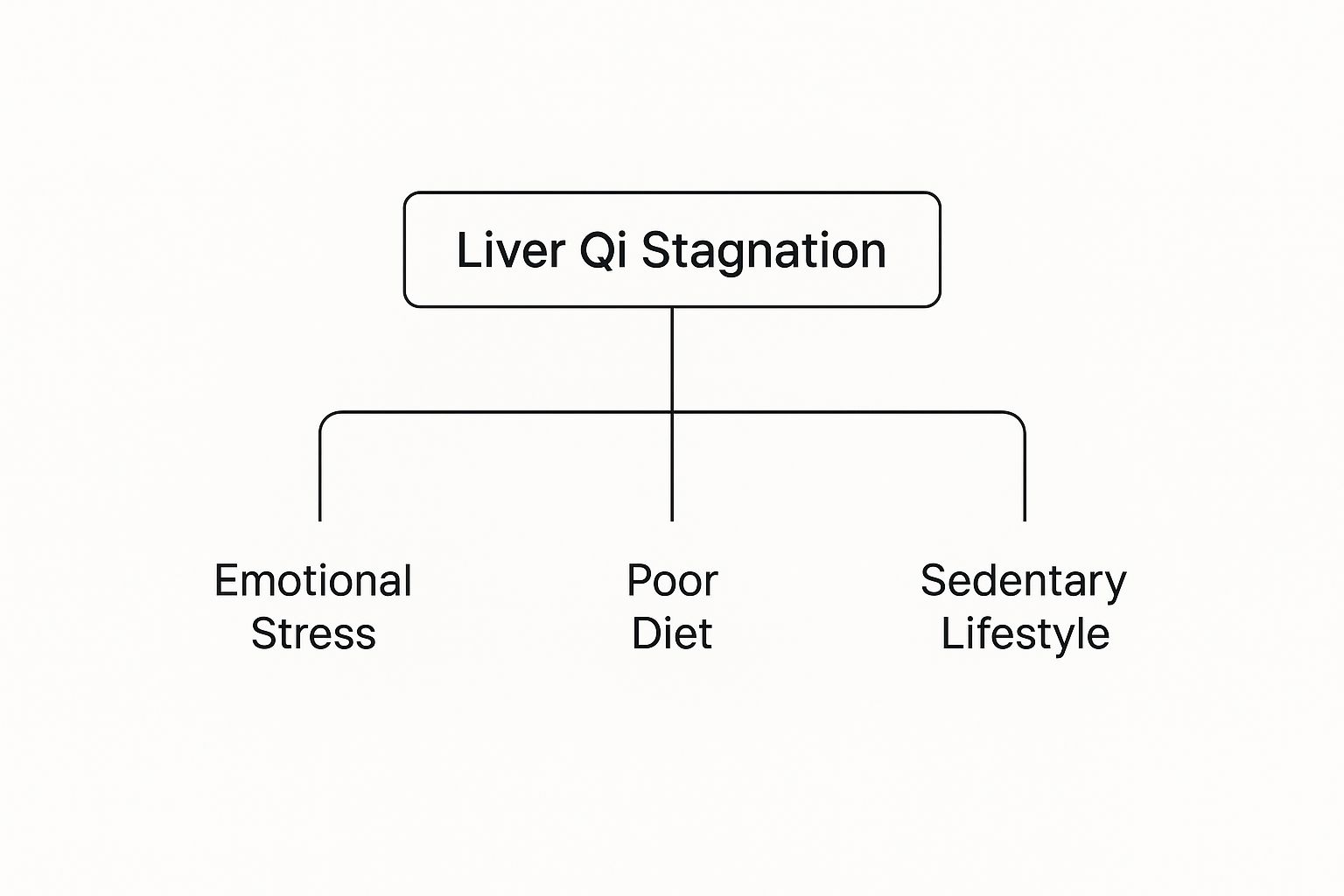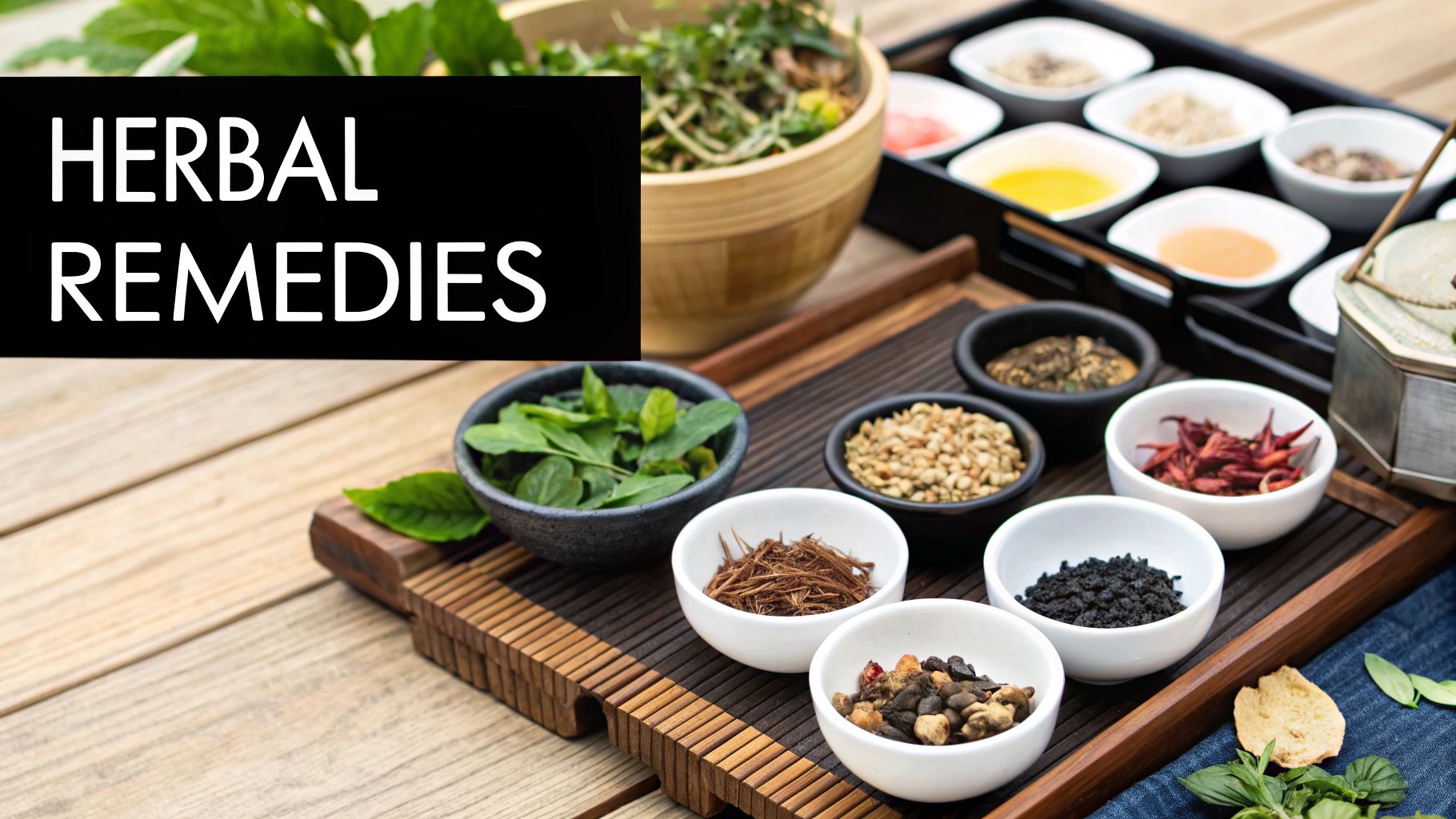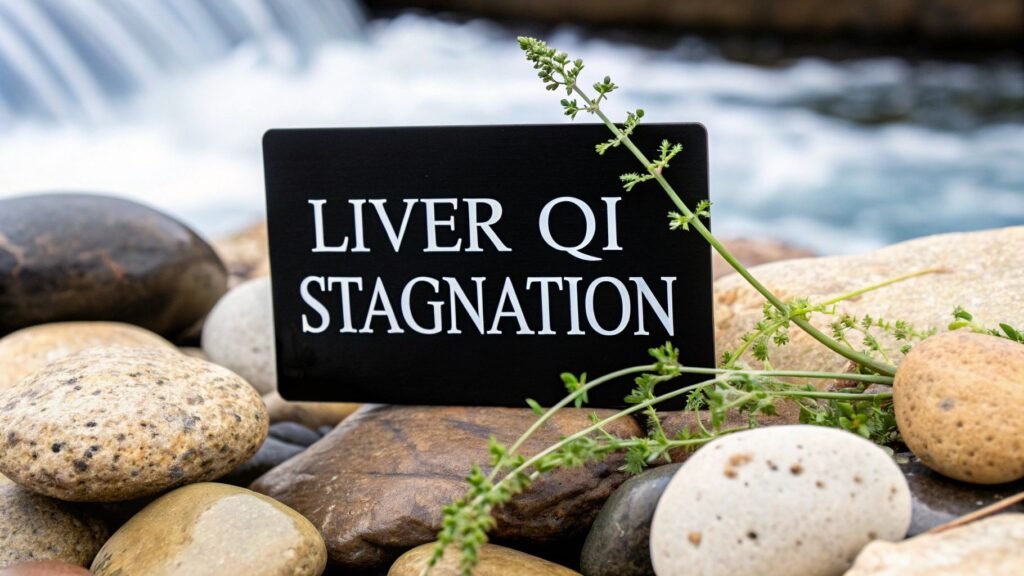When you're dealing with Liver Qi Stagnation, the signs often show up as irritability, unpredictable mood swings, and a whole lot of sighing. It’s that persistent feeling of being emotionally or physically "stuck." This energy jam can also manifest physically, causing discomfort and tension in your ribs, bloating, and throwing your menstrual cycle out of whack.
Getting to the Heart of Liver Qi Stagnation
In Traditional Chinese Medicine (TCM), we often think of the body's energy, or Qi, as a complex river system. It’s meant to flow freely, nourishing every single part of you. In this system, the Liver is the master engineer, directing the smooth flow of Qi to keep your emotions steady and your body in harmony.
So, what happens when something dams up that river?
That's the core of Liver Qi Stagnation. When things like chronic stress, deep-seated frustration, or repressed anger start to pile up, they can disrupt the Liver's ability to keep things moving. Even the food you eat can play a role. When the Liver's function is compromised, the Qi gets stuck. It backs up, creating an internal traffic jam. This isn't just an abstract idea—it sets off a cascade of very real liver qi stagnation symptoms that you can feel in both your body and your mind.
Think of the Liver as the manager of your body's entire "flow." Its main job is to ensure everything moves smoothly, without getting bottled up. This critical role touches on several key aspects of your health:
What the Liver's Flow Governs
- Emotional Balance: When Liver Qi flows freely, you can adapt to life's ups and downs. But when it stagnates, emotions like anger, frustration, and resentment get trapped, simmering just below the surface.
- Smooth Digestion: The Liver plays a supporting role for the Spleen and Stomach, making sure Qi moves correctly to power digestion. Blockages here are a classic cause of bloating, cramping, and unpredictable bowel habits.
- Women's Health: For a regular, pain-free menstrual cycle, the Liver's ability to govern the smooth flow of both Qi and Blood is absolutely essential. Stagnation is a primary culprit behind many menstrual issues.
- Physical Tension: Unobstructed Qi keeps your muscles and tendons relaxed and supple. Stagnation is what leads to that hallmark physical tightness, especially in the neck, shoulders, and along the sides of your rib cage.
This shows us that the Liver's influence in TCM goes way beyond the physical organ. It orchestrates the very rhythm of your internal world. By taking a moment to understand what Qi is in Chinese Medicine, you can truly appreciate why its smooth, unimpeded flow is so fundamental to feeling your best.
When that flow is compromised, the resulting stagnation is your body's way of sending a clear signal that something is out of balance and needs to be addressed.
The Emotional Toll of Blocked Qi

While the physical discomforts are telling, the most immediate and recognizable liver qi stagnation symptoms often show up in our emotional state. In the world of Chinese Medicine, the Liver is the organ in charge of ensuring everything flows smoothly—especially our Qi. This flow directly governs our emotional flexibility and resilience.
When that flow gets jammed up, it's like an emotional pressure cooker building steam with no way to vent. Suddenly, a minor annoyance, like getting stuck behind a slow driver, can trigger a disproportionate amount of rage. You might find yourself snapping at loved ones over small things or just feeling a constant, simmering frustration bubbling right below the surface.
This isn't just about "being stressed." It's a very specific pattern of emotional imbalance that comes from deep within. The Liver's connection to feelings like anger, resentment, and irritation is profound. When we bottle these emotions up or don't process them, they directly interfere with the Liver's job, creating a nasty feedback loop: blocked Qi fuels more frustration, and that frustration, in turn, blocks the Qi even more.
The Signature Feelings of Stagnation
Imagine a river that’s been dammed. The water—your Qi—gets murky, turbulent, and presses hard against the barrier. Emotionally, this backup creates some very distinct feelings:
- Irritability and Frustration: A pervasive sense of being annoyed or on edge, often without a clear reason.
- Sudden Mood Swings: Lurching from calm to furious or from happy to tearful with very little warning.
- Frequent Sighing: This is your body's unconscious attempt to physically move stuck Qi and release that pent-up tension in the chest.
- A Sense of Being "Stuck": The feeling of being trapped in your life, career, or relationships, coupled with a deep frustration about not being able to move forward.
When Qi becomes constrained, it creates an internal environment where emotions cannot be processed effectively. This blockage often leads to a feeling of being emotionally overwhelmed, making it difficult to maintain a balanced perspective on daily challenges.
The Link to Depression and Anxiety
This persistent emotional strain can take a heavy toll. Research exploring the links between TCM patterns and mental health has uncovered a strong correlation between Qi stagnation and depression. One study, for instance, found that Qi stagnation symptoms were significantly tied to the severity of depression in university students, reinforcing the TCM perspective that these imbalances are a direct contributor to emotional distress.
This kind of emotional blockage can also show up as anxiety, but it’s often a very agitated, restless type of anxiety—that feeling of being trapped and desperately wanting to escape. Recognizing this pattern is the key, as it points us toward a clear path for treatment. You can dive deeper into this with our guide on https://drerictsai.com/f/%F0%9F%A7%8D%E2%80%8D%E2%99%82%EF%B8%8Feric-tsai-lac-msaom-bpharm#44cae461-999c-4ec1-82f4-fe3dbdc25492/traditional-chinese-medicine-for-anxiety.
To really start working on the emotional fallout, it helps to incorporate practical tools like mindfulness activities to reduce stress and prevent burnout. Learning to read these emotional signals is the first, most crucial step toward bringing your body back into harmony.
Decoding the Physical Symptoms of Stagnation
While emotional upset is a huge red flag for blocked Qi, the physical signs are just as telling—and often, they’re the first thing we notice. When the Liver’s energy highway gets jammed up, the blockage creates very real, tangible tension that can throw other body systems out of whack. These physical liver qi stagnation symptoms are your body's way of sending out an S.O.S.
Think of it like a garden hose with a big kink in it. Water pressure builds up behind that kink, making the hose bulge and feel rigid. In the same way, stagnant Liver Qi creates a kind of internal pressure and tension that tends to settle in specific areas of the body, leading to that stubborn, chronic tightness and pain so many of us know too well.
Tension and Discomfort Hotspots
In TCM, the Liver meridian—its primary energy channel—runs up the sides of the body. So, when Qi gets stuck, you'll often feel it right along this pathway. This is why some of the most classic physical signs include:
- Neck and Shoulder Tightness: That persistent, deep-seated tension in your upper back, neck, and shoulders that a massage only seems to help for a little while.
- Tension Headaches: These aren't just any headaches. We're talking about that specific throbbing or sharp pain you feel at your temples or right behind your eyes.
- Hypochondriac Pain: This is a hallmark symptom—a distinct feeling of fullness, distension, or nagging discomfort right under your rib cage, especially on the right side where the Liver sits.
The image below shows how a few core lifestyle habits can really set the stage for Liver Qi Stagnation.

As you can see, emotional stress, what we eat, and how much we move are the big three culprits that can clog up the free flow of Qi.
Digestive and Menstrual Disruptions
The Liver's role as the body's master regulator is critical for smooth digestion and a regular menstrual cycle. When its flow is held up, it often starts to "bully" the Spleen and Stomach, leading to digestive chaos. Instead of things running like clockwork, you get symptoms that flare up, often getting much worse when you're stressed.
It's a similar story with menstruation. The Liver is in charge of the smooth movement of Blood, which is absolutely fundamental for a healthy cycle. When Qi gets stuck, it directly snarls this process, causing a whole cluster of premenstrual and period-related problems.
In TCM, the link between feeling stressed out and then getting bloated or having painful periods isn't just a coincidence. It’s seen as a direct consequence of the Liver failing to keep energy and blood flowing smoothly throughout the body.
It can be tricky to tell these specific patterns apart from everyday health complaints. This table is designed to help you spot the subtle but important differences.
Liver Qi Stagnation Symptoms vs General Ailments
| Symptom Category | Liver Qi Stagnation Manifestation | Common General Ailment Manifestation |
|---|---|---|
| Digestion | Bloating, gas, and cramping that clearly get worse with stress or emotional upset. | Consistent indigestion that seems tied to specific foods, regardless of your mood. |
| Headaches | Tension headaches centered at the temples or the sides of the head. | Headaches that pop up in different locations with various triggers, like sinus pressure or not drinking enough water. |
| Menstrual Cycle | Intense PMS with breast tenderness, irritability, and painful periods with dark clots. | Mild, predictable cramping without major emotional swings or significant breast distension. |
Learning to recognize these specific physical patterns is a game-changer. It helps you connect the dots between seemingly unrelated issues—like your chronic shoulder tension and your digestive troubles—and trace them back to a single underlying imbalance. This shift in perspective gets you out of the cycle of just chasing symptoms and puts you on the path to addressing the root cause for more effective, lasting relief.
When Stagnation Contributes to Chronic Conditions
While the day-to-day emotional and physical liver qi stagnation symptoms are certainly disruptive, the consequences of a long-term blockage can be far more serious. When your body’s Qi remains stuck over a long period, it can start to impact your fluids and even your Blood, leading to physical accumulations and more complex health problems down the road.
Think of it like a slow-moving stream. If the water isn't flowing freely, debris and sediment start to settle and build up. Eventually, this buildup can solidify, completely changing the stream's environment. In much the same way, chronic Liver Qi Stagnation can lay the groundwork for a whole host of modern health conditions, especially those involving growths, inflammation, or hormonal imbalances.
This progression from an energetic blockage to a physical manifestation is a cornerstone of TCM theory. Your body is always striving for balance, but when the flow is consistently blocked, it creates an internal environment where more stubborn health patterns can take hold.
The Link to Women's Health Conditions
This connection is especially clear when it comes to women's health. In TCM, the Liver meridian is intimately tied to the reproductive system, and its smooth flow is crucial for a healthy menstrual cycle. When stagnation becomes a chronic issue, it can be a key underlying factor in conditions like:
- Fibrocystic Breasts: The formation of tender, lumpy breast tissue is often seen as a direct result of Qi and Phlegm building up in the chest, a pattern frequently made worse by emotional stress.
- PCOS and Endometriosis: These complex conditions often involve patterns of both Qi and Blood Stasis, which can lead to irregular cycles, significant menstrual pain, and cysts.
- Uterine Fibroids: These benign growths are typically linked to long-standing Blood Stasis, a condition often set in motion by an initial Qi Stagnation.
In TCM, a physical mass is rarely viewed as an isolated issue. Instead, it’s often seen as the end result of a long-term functional imbalance, with Liver Qi Stagnation frequently being the root cause.
This ancient perspective is now finding its footing in modern integrative medicine. For example, studies have documented a high prevalence of what TCM calls 'Qi stagnation due to Liver depression' among breast cancer patients. In one study, it accounted for 30.5% of cases, making it the most significant TCM syndrome subtype observed. The key signs were distending chest pain, depression, and the presence of a breast mass. You can read the full research about these clinical findings for a deeper look.
This underscores why managing Qi flow isn't just about feeling better day-to-day—it can be a vital complementary strategy when facing serious health challenges.
How to Restore Flow Through Diet and Lifestyle

Dealing with the emotional and physical fallout of liver qi stagnation isn't a passive process—it requires action. The fantastic news is that you don't need a massive overhaul. Simple, consistent changes to your daily life can start to clear that energetic traffic jam, getting your qi moving freely once again. It all comes down to three key areas: movement, emotional processing, and a supportive diet.
Imagine your Liver Qi is like a powerful river. When it's blocked, pressure builds up. The goal is to gently remove the dams. Regular physical activity is one of the most effective ways to do just that, creating channels for stagnant energy to flow.
Prioritize Daily Movement
The point of moving your body isn't to push it to the limit; it's to release pent-up tension and get things circulating again without adding more stress. Think about incorporating practices that are all about flow and flexibility—the natural enemies of stagnation.
- Yoga and Tai Chi: These ancient practices are practically designed to move qi. Twisting yoga poses, for instance, are said to gently "wring out" the Liver and its channels. The slow, deliberate movements of tai chi are incredible for promoting a sense of harmony throughout the entire body.
- Brisk Walking: Never underestimate the power of a simple walk, especially if you can get outside in nature. It gets your blood and energy moving while clearing your head, offering a one-two punch of physical and mental relief.
- Stretching: Pay special attention to the sides of your body, along your ribs, and up into your neck and shoulders. This is prime real estate for stagnant Liver Qi to get stuck and cause tightness.
Manage Stress and Process Emotions
Since bottled-up emotions are a root cause of this pattern, finding a healthy release valve is non-negotiable. It's about letting feelings move through you before they get stuck in you.
Creating intentional space to express your feelings is a critical step in resolving Liver Qi Stagnation. Whether you journal, talk it out with a trusted friend, or channel it into a creative hobby, allowing emotions to flow out keeps them from stagnating in.
Even simple acts like taking a few deep, diaphragmatic breaths or letting out a good, heartfelt sigh can offer immediate relief by physically moving that stuck energy in your chest.
Adopt a Qi-Moving Diet
What you put on your plate can either contribute to the blockage or help clear the way. A diet that supports your Liver is clean and fresh, steering clear of foods that are heavy, congesting, and hard for your body to process.
Things like greasy, fried, and heavily processed foods can easily bog down your digestive system, which only adds to the stagnation. Alcohol is notoriously hard on the Liver and should be kept to a minimum if you're trying to get your qi flowing smoothly.
On the flip side, certain foods are known for their ability to get things moving:
- Leafy Greens: Think kale, chard, collards, and spinach. These greens are fantastic for supporting your Liver's natural functions.
- Pungent Flavors: Foods like onions, garlic, mint, basil, and scallions have a naturally dispersing quality that helps break up energetic logjams.
- Sour Tastes: A small amount of sour flavor, like a squeeze of lemon in your water or a splash of apple cider vinegar, can gently stimulate qi and get it flowing.
While these foods are a great start, it's also smart to learn how to improve gut health in general, as a happy digestive system is the foundation for your overall energy and vitality. By weaving these habits into your life, you empower your body to find its balance and restore the free-flowing energy you need to feel your best.
When to Seek Professional TCM Treatments

While changing your diet and daily habits can make a real difference for mild liver qi stagnation, sometimes the energetic gridlock is just too much to handle on your own. If your symptoms are sticking around or starting to seriously interfere with your life, that’s a clear signal it’s time to see a licensed Traditional Chinese Medicine (TCM) practitioner.
When the stagnation runs deep, professional treatments like acupuncture and herbal medicine offer a direct and powerful way to break up the logjam and get things flowing smoothly again. These therapies go straight to the root of the energetic imbalance, providing a level of relief that lifestyle tweaks alone often can't reach.
Acupuncture and Acupressure for Releasing Stagnation
Acupuncture is a cornerstone for moving stuck Qi. By inserting incredibly fine needles into specific points along the body’s energy pathways, a practitioner can essentially communicate with your system to restore order. Think of it like a skilled technician clearing debris from a blocked river, allowing energy to flow freely and wash away pent-up tension. If you're new to the idea, you can get a better sense of what to expect from an acupuncture session in our detailed guide.
This isn’t just ancient wisdom; modern research is catching up. One clinical trial demonstrated that acupuncture aimed at soothing Liver Qi had significant antidepressant effects. Patients experienced at least a 25% drop in symptoms on the Hamilton Depression Rating Scale, which researchers linked to a boost in serotonin and a decrease in inflammation. You can read the full research about these findings for a deeper dive into the science.
Chinese Herbal Medicine Custom Formulations
Chinese herbal medicine is another incredibly effective tool. A trained practitioner doesn't just hand you a bottle off the shelf; they create a unique formula tailored precisely to your specific pattern of disharmony.
One of the most celebrated formulas for this condition is Xiao Yao San, which beautifully translates to "Free and Easy Wanderer."
This classic blend works to soothe the Liver, support the digestive system, and nourish the Blood—tackling the core systems thrown off balance by chronic stagnation.
An experienced herbalist will often use a formula like this as a base, modifying it with other herbs to perfectly address your individual symptoms. It’s a truly personalized approach to guide you back to a state of balance and ease.
Answering Your Questions About Liver Qi Stagnation
Diving into the world of Traditional Chinese Medicine can definitely spark a few questions. Let's clear up some of the most common ones so you can better understand this pattern and feel confident about your next steps.
Is Liver Qi Stagnation the Same as Liver Disease?
This is probably the most important question we get, and it's a critical distinction to make. The short answer is no.
In TCM, "Liver Qi Stagnation" describes an energetic imbalance—it’s about how energy, or Qi, is flowing (or not flowing) throughout your body. It’s a pattern of disharmony, not a physical disease of the liver organ that a Western doctor would diagnose.
You could have a perfect blood test with completely normal liver enzymes and still be dealing with all the classic signs of liver qi stagnation. That’s because in Chinese medicine, the "Liver" system is much broader; it governs the smooth flow of Qi, regulates emotions, and stores the blood.
How Long Until I Start Feeling Better?
There’s no one-size-fits-all answer here, as it really depends on how long things have been out of balance. If your symptoms are fairly new and popped up after a particularly stressful month, you might start feeling a shift within just a few weeks of making some focused diet and lifestyle adjustments.
On the other hand, if you've been dealing with deep-seated stagnation for months or even years, it's going to take more time and patience to unravel. For these more chronic patterns, lasting change often requires a dedicated approach with professional treatments like acupuncture and custom herbal formulas.
When Should I Talk to a TCM Practitioner?
While self-care is a fantastic starting point, it's time to bring in a professional if:
- Your symptoms are severe and are getting in the way of your daily life.
- You’ve been trying things on your own for a few weeks but aren't seeing any real improvement.
- You feel like your symptoms are actually getting worse.
- You’re also navigating more complex health issues like PCOS, fibroids, or chronic digestive problems.
A qualified practitioner can look at the whole picture, give you an accurate diagnosis, and create a plan that gets to the root of the problem.
If you're ready to move past the frustration of your symptoms and address the underlying cause, Eric Tsai Acupuncture and Herbs provides personalized care to help restore your body's natural harmony. Book your consultation today and begin your journey back to feeling your best.

